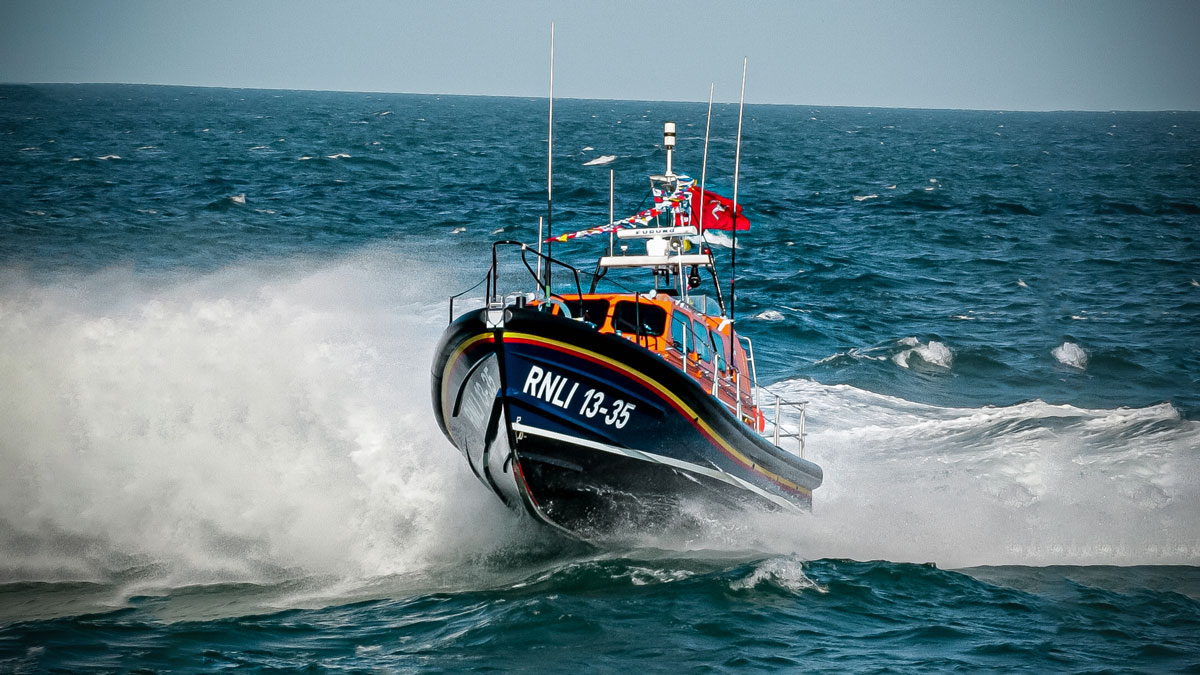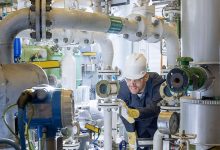Decarbonising Maritime Sector
MAHLE Powertrain Pushes Clean Engines in Maritime Fleets
MAHLE Powertrain is leading a project to develop sustainable propulsion solutions to retrofit to high performance marine vessels where battery and other electrified technologies may not prove practical. The collaboration with the Royal National Lifeboat Institution (RNLI), the University of Nottingham and Clean Air Power will initially target search and rescue vessels. The low energy density and high weight of current battery technologies, coupled with the need to quickly replenish for the next mission, means that alternative green propulsion solutions are required. MAHLE’s Jet Ignition® (MJI) technology, optimised for hydrogen combustion under the name HyJet, enables the ignition of sustainable fuels in clean combustion engines. The project will aim to deliver retrofit solutions at scale across commercial, professional, and governmental fleets.
“The current and predicted future state of battery technology can’t offer the range and performance required by the RNLI at an acceptable weight for retrofit to its lifeboats,” explains Martin Berger, Vice President Corporate Research and Advanced Engineering at MAHLE. “The RNLI has committed to eliminating or reducing impacts on the environment, and to become a low-carbon, climate-resilient organisation,” said Victoria Limbrick, Carbon & Energy Manager, RNLI. “Fuel for our lifeboats, rescue watercraft and logistics vehicles account for around 57 per cent of our total energy use. The HyJet project offers an exciting opportunity to investigate and learn about potential solutions that could help meet our challenging sustainability targets and to fulfil our ambition to move away from fossil fuels.”
MAHLE’s Jet Ignition technology consists of a small pre-chamber which can be fitted into the cylinder head. Combustion is initiated in this pre-chamber, with the resulting hot combustion gas forced through small orifices into the main combustion chamber as a series of jets which quickly and uniformly ignite the remaining mixture. This ensures clean, efficient combustion throughout the main chamber with little or no pollutants such as nitrogen oxides, even when operating with lean hydrogen mixtures or other sustainable fuels that are well beyond the capability of traditional spark ignition systems. The HyJet (Hydrogen Jet ignition) project will begin by analysing usage data collected from the RNLI’s vessels during real-world operation to establish the fleet requirements and to help identify the optimum approach for clean operation. This technology-agnostic approach will also consider the issue of on-board fuel storage and refuelling, critical to deployment in an emergency setting, and will also assess the impact on vessel safety standards and regulatory compliance. Marine engines are typically designed with long service lives in mind and are fitted to vessels that are required to operate for many decades. Key to the success of HyJet is a focus on a cost-effective solution that can be retrofitted – a concept already proven by MAHLE Powertrains experience in the passenger car and heavy-duty sectors – opening the door to rapid decarbonisation of existing fleets. Headed by MAHLE Powertrain, the all-British consortium comprises Clean Air Power, providers of the critical fuel injection system, and the University of Nottingham’s renowned Powertrain Research Centre with responsibility for fuel storage assessment and testing. Hybrid Marine Power will act as a consultant, providing legislative impact analysis alongside their experience of marine safety standards and the wider industry. Funded by the Department for Transport as part of the Clean Maritime Demonstration Competition, HyJet’s findings lay the foundations for a follow-on project to create a real-world demonstrator vessel. The project’s focus on commercialisation will establish a clear route to market that can be scaled throughout the marine sector, helping it to reduce greenhouse gas emissions and accelerate the transition towards net zero. MAHLE has a broad expertise in maritime propulsion and collaborates closely with leading shipbuilders to develop components for modern and efficient engines as well as for fuel cell based maritime propulsion solutions. The range of products extends from fuel cell thermal management solutions over coolers, radiators, engine components and power cell units up to filtration solutions for clean shipping.
About MAHLE
MAHLE is a leading international development partner and supplier to the automotive industry with customers in both passenger car and commercial vehicle sectors. Founded in 1920, the technology group is working on the climate-neutral mobility of tomorrow, such as fuel cells and hydrogen motors, with a focus on e-mobility and thermal management as well as further technology fields to reduce CO2 emissions. MAHLE already generates over 60 percent of its sales independently of the passenger car combustion engine. This should increase to 75 percent by 2030. Today, one in every two vehicles globally is equipped with MAHLE components.
MAHLE generated sales of around EUR 11 billion in 2021. The company is represented with over 71,000 employees at 160 production locations and 12 major research and development centres in more than 30 countries.
About MAHLE Powertrain
MAHLE Powertrain is a specialist in providing engineering services for the design, development and integration of advanced internal combustion engines and electrified powertrain systems. As a recognised expert in these fields, MAHLE Powertrain is engaged in the extensive research, development, and application of new traditional and advanced drivelines into cost-effective, production feasible solutions for enhanced efficiency, improved fuel economy and lower emissions.
As a services subsidiary of the MAHLE Group, MAHLE Powertrain has six technical centres strategically located in the UK, Germany, USA, and China and is well-placed to provide solutions around the globe. It operates independently of the main group when considering choice of components or technologies.
About The RNLI
The Royal National Lifeboat Institution charity saves lives at sea. Its volunteers provide a 24-hour search and rescue service around the United Kingdom and Republic of Ireland coasts. The RNLI operates 238 lifeboat stations in the UK and Ireland and more than 240 lifeguard units on beaches around the UK and Channel Islands. The RNLI is independent of Coastguard and government and depends on voluntary donations and legacies to maintain its rescue service. Since the RNLI was founded in 1824, its lifeboat crews and lifeguards have saved over 142,700 lives.
About The Clean Maritime Demonstration Competition
The HyJet project is part of the Clean Maritime Demonstration Competition Round 2 (CMDC2) which was launched in May 2022, funded by the Department for Transport, and delivered in partnership with Innovate UK. As part of the CMDC2, the Department allocated over £14m to 31 projects supported by 121 organisations from across the UK to deliver feasibility studies and collaborative R&D projects in clean maritime solutions. The CMDC2 is part of the UK Shipping Office for Reducing Emissions (UK SHORE) flagship multi-year CMDC programme. In March 2022, the Department announced the biggest government investment ever in the UK commercial maritime sector, allocating £206m to UK SHORE, a new division within the Department for Transport focused on decarbonising the maritime sector.







